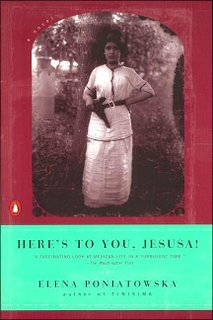Here's To You, Jesusa!
 This is a phenomenal story of a woman's search for identity in the volatile years of the Mexican Revolution. The story follows Jesusa from her earliest memories in a countryside with her family, to the life of a working-class elderly woman in the maze of Mexico City. The reader sees it all, from the peace of childhood to the discovery of her spirituality to industrialization. It seems as though Poniatowska creates Jesusa's narrative to serve as a metaphor for Mexico and what it is experiencing politically, socially, and psychologically at this time. Jesusa is the heroine of the story and, although she is at times so outrageous and difficult to understand, her strength, humor and sense of self give the first-person narrative such an overwhelming authority. For instance:
This is a phenomenal story of a woman's search for identity in the volatile years of the Mexican Revolution. The story follows Jesusa from her earliest memories in a countryside with her family, to the life of a working-class elderly woman in the maze of Mexico City. The reader sees it all, from the peace of childhood to the discovery of her spirituality to industrialization. It seems as though Poniatowska creates Jesusa's narrative to serve as a metaphor for Mexico and what it is experiencing politically, socially, and psychologically at this time. Jesusa is the heroine of the story and, although she is at times so outrageous and difficult to understand, her strength, humor and sense of self give the first-person narrative such an overwhelming authority. For instance:"Me, imprisoned in my pots and pans, but I'm not much of a fighter anymore or as mean on the streets now, because I got old and now my blood doesn't boil and I've lost my strength and my hair fell out and I just have pegs for teeth, I'd scratch myself, but I don't have any fingernails left after so many came out in the laundry sink. And here I am now, just waiting for it to strike five in the morning because I can't sleep and it all comes back to me, everything I've been through since I was little and I walked around barefoot, fighting in the Revolution like playing blindman's bluff, being beaten, more unwrapped each time in this fucked up life."
Poniatowska is most famous for a collection of memories from surivors of the Tlatelolco massacre of 1968, "Massacre in Mexico." Because of her career as both a novelist and journalist her works combine fiction and documentary forms such as archival pictures, oral histories, and interviews. The introduction of Here's To You Jesusa! has a detailed account of interviews between Poniatowska and a woman that Jesusa's character is based on. This is an extremely compelling and heart-wrenching novel and I highly recommend it.



1 Comments:
Its an outstanding account of a peasant in Mexico during the 20th century. If you share similar backgroud with Jesusa, either by being from a third world country or have a abuelita with the same attituted( which i did not understood until i read this book) you will apreciate these lost memories that most historians have not write much on. A life of a soldadera that was in part worst than being a male peasant. Like then and now, Jesusa may symbolize a form of women struggles and identity in this world.
Post a Comment
<< Home